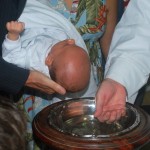 It seems strange now that I don’t remember the word I spelled to win the school spelling bee when I was in sixth grade. You would think that moment would be bronzed in my long-term memory bank. Instead, I remember two other moments from that spelling bee with crystalline clarity.
It seems strange now that I don’t remember the word I spelled to win the school spelling bee when I was in sixth grade. You would think that moment would be bronzed in my long-term memory bank. Instead, I remember two other moments from that spelling bee with crystalline clarity.
The first moment was sitting on the stage, looking over at the judges’ table, and seeing the trophy that would be presented to the winner. “I’m going to win that,” I told myself. I was not a particularly self-confident child, so my resolution was rather out of character. But the self-knowledge and determination were so strong that the tears in my eyes when I was nearly eliminated at one point in the competition were not so much because it seemed I had lost, but because I did not keep my word to myself.
The second moment was when I spelled a word that had wiped out half the contestants on the stage. It was a word I knew because I had misspelled it when my grandmother quizzed me in preparation for the competition, so I made special effort to memorize it. That is the one word I remember from that competition, not the word with which I won. The word was principle (pri–nci–ple, which is how I memorized it).
I have only those memories from that competition that took place over 30 years ago. I no longer have the trophy. It was lost at some point in the years since.
Which is why I read with some interest the answer Natalie Portman gave to the question of where she keeps the Oscar she won for Best Actress in 2011 for the movie Black Swan:
I [the interviewer] ask whether she keeps it [the statuette] in Paris. “I don’t know where it is,” she says. “I think it’s in the safe or something. I don’t know. I haven’t seen it in a while. I mean, Darren [Aronofsky] actually said to me something when we were in that whole thing that resonated so deeply. I was reading the story of Abraham [from the Bible] to my child and talking about, like, not worshipping false idols. And this is literally like gold men. This is literally worshipping gold idols—if you worship it. That’s why it’s not displayed on the wall. It’s a false idol.”
I can imagine that some people rolled their eyes when they saw the headlines such as Natalie Portman won’t display her Oscar because it’s a false idol—which, unsurprisingly, topped her negative opinion of the re-election Israeli Prime Minister Benjamin Netanyahu as headline-worthy clickbait. The sensationalistic headlines tend to encourage people to give a literal interpretation to her words: “Heh! Hollywood actress thinks little gold man is a false god. Har, har!”
But let’s look at some context.
Natalie Portman did not reject her award on religious principles (as others have done for ethical, philosophical, and political principles). She showed up at the ceremony. She accepted her award. She thanked the Academy for presenting it to her. Then she probably stuffed it in a safe (she’s not sure) and forgot about it.
It seems fair to speculate then that it is not the statuette itself that she objects to owning; it is the attitude that the statuette should be elevated to a place of honor in her home.
All in all, that seems to me to be an admirable attitude. Value the experience, value a job well done, value recognition from peers for a job well done . . . but keep it in context. What matters is not the statuette itself, but all that it represents. Like my own remembrances of special moments from a long-ago competition but not the trophy itself, perhaps what Portman remembers most about her time on Black Swan is not the location of the Oscar she won for it but pushing through an injured rib to complete the movie.
The Catechism of the Catholic Church teaches that idolatry is not merely about bowing down to images crafted from precious metals or carved in stone. Idolatry is any attitude that elevates what is not God into a false god:
Idolatry not only refers to false pagan worship. It remains a constant temptation to faith. Idolatry consists in divinizing what is not God. Man commits idolatry whenever he honors and reveres a creature in place of God, whether this be gods or demons (for example, satanism), power, pleasure, race, ancestors, the state, money, etc. Jesus says, “You cannot serve God and mammon.” Many martyrs died for not adoring “the Beast” refusing even to simulate such worship. Idolatry rejects the unique Lordship of God; it is therefore incompatible with communion with God (CCC 2113).
C. S. Lewis once wrote about first and second things. In a nutshell, his point was that we must rightly prioritize the goods in our life. If we do not, if we value what is second over what should be first, we will lose perspective and ultimately lose both goods. He said:
When I have learnt to love God better than my earthly dearest, I shall love my earthly dearest better than I do now. Insofar as I learn to love my earthly dearest at the expense of God and instead of God, I shall be moving toward the state in which I shall not love my earthly dearest at all. When first things are put first, second things are not suppressed but increased.
I rather think C. S. Lewis would have nodded approvingly had he read Natalie Portman’s response that she really doesn’t know where her Oscar is.
(Image credit: Wikimedia Commons)
















